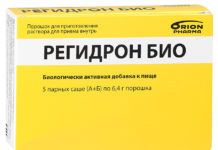St. John's wort is a herbaceous plant of a perennial type, having a two or four-sided stem, small whole-edge leaves and single yellow flowers. About fifty plant species are known. On the territory of the Russian Federation, two of them are mainly found - ordinary (perforated) and tetrahedral. You can find grass in forest glades, edges, along the roads. Flowering occurs from June to August. The collection of a medicinal plant is carried out after June 24. The healing properties of St. John’s Wort herb have been used since ancient times in the treatment of many diseases. Components obtained from raw materials are part of official and alternative medicines. The article provides detailed information about which plant St. John's wort, medicinal properties and contraindications for women and men, describes how to use it.
Interesting to know! St. John's wort got its name from the word "Jerobo" from the Kazakh language, which translates as "healer of wounds." Some poisonous effect on animals that the grass has is not related to its name.
Material Content:
- 1 Useful and medicinal properties of St. John's wort grass
- 2 What treats hypericum?
- 2.1 Angina
- 2.2 Anemia
- 2.3 Sore throat
- 2.4 Varicose veins
- 2.5 Gastritis and ulcer
- 2.6 Hypotension, impotence
- 2.7 Dizziness
- 2.8 Stroke, Depression, Sleepwalking
- 2.9 Cough
- 2.10 Oil for migraines and colds
- 2.11 Mastopathy
- 2.12 Urolithiasis disease
- 2.13 Neuralgia
- 2.14 Bad breath
- 2.15 Cold
- 2.16 Liver Prevention
- 2.17 Psoriasis
- 2.18 Radiculitis
- 2.19 Menstruation failure
- 2.20 Stomatitis, bleeding gums
- 2.21 Stress
- 2.22 Pulmonary tuberculosis
- 2.23 Immunity strengthening
- 2.24 Cholecystitis
- 2.25 Cervical erosion
- 3 Contraindications
Useful and medicinal properties of St. John's wort grass
The composition of the herb contains many substances that can positively affect the state of human health.
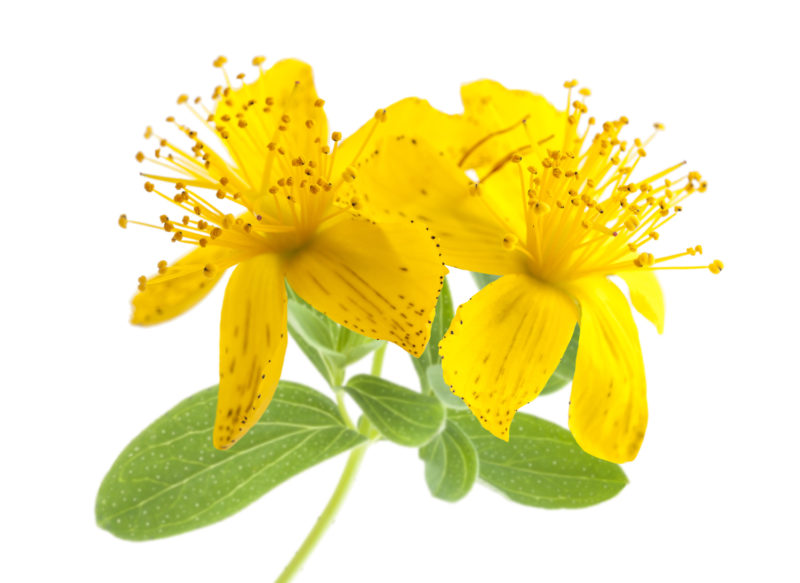
The medicinal qualities of "St. John's wort" are due to the presence in it:
- hyperecin;
- pseudohypericin;
- hyperforin;
- adperforin;
- essential oils;
- flavonoids;
- isovaleric acid;
- other organic acids;
- choline;
- vitamins;
- ceryl alcohol.
Most often, St. John's wort is brewed as a sedative. Sedative effect on the body develops due to hyperecin and pseudo-hyperecin. These substances affect dopamine structures, which ensures their psychoactive effect.
It is worth noting that the antidepressant effect of St. John's wort preparations is similar to that of chemical soothing drugs of the middle link. Grass is not suitable for dealing with severe depression. However, she copes with pathology of small and medium severity.
In addition to the sedative effect, St. John's wort is used as an antiseptic, antispasmodic, as an anesthetic and general tonic. In combination with holly cassia it is used as a laxative.
From time immemorial, grass has gained fame as "good blood." In the Middle Ages, St. John's wort was used for local treatment of purulent-inflammatory processes and bruised wounds, which often occurred after fistfights.
What treats hypericum?
Folk healers recommend hypericum-based dosage forms for the treatment of many diseases. It is necessary to consider the features of the preparation and administration of this herb for each individual pathology.
It is interesting:therapeutic properties and contraindications for horse chestnut
Angina
For the treatment of tonsillitis and other inflammatory diseases of the throat, St. John's wort is recommended to be used in combination with propolis. To prepare the dosage form, a large spoon of dry and powdered plants is poured with 200 ml of boiling water, kept for 15 minutes in a water bath. After this, the broth is cooled, filtered and 20 drops of 10% alcohol extract of propolis are added to it.
The resulting composition is applied topically to gargle. You should put a little decoction in your mouth, tilt your head back and exhale air so that the liquid in the mouth gurgles. The procedure is performed several times for 20-30 seconds. At the same time, astringents and anti-inflammatory components of St. John's wort actively destroy bacteria present in the focus of inflammation. Rinses are repeated 2-3 times a day until the symptoms disappear completely.
Anemia
In some popular directories there is information that St. John's wort can be used to treat anemia. It should be understood that the medicinal properties of the plant appear only if anemia was caused by chronic bleeding in the gastrointestinal tract. At the same time, treatment with St. John's wort allows you to accelerate the healing of ulcers and cracks, which eliminates the possibility of blood loss and leads to recovery.
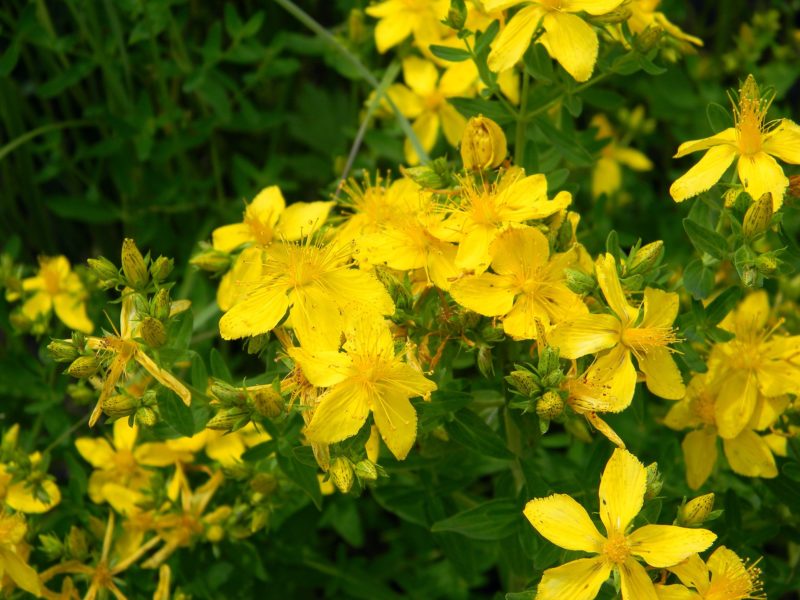
Hypochromic anemia associated with insufficient intake of iron ions in the body, is not subject to therapy with St. John's wort. The fact is that the plant contains tannins - astringent components. When taking the decoction inside, they bind trace elements (including iron), not allowing it to be absorbed into the blood.
For the treatment of anemia caused by chronic blood loss, St. John's wort is used in the form of the decoction described above, from which propolis is excluded. It is recommended to take the drug in ½ cup 3 times a day, half an hour before meals. The doctor should monitor the healing process of ulcerative defects.
Sore throat
Another effective recipe based on St. John's wort, which allows you to treat sore throat, is inhalation. To prepare the solution, 2 tablespoons of chopped grass is poured with 0.5 liters of water and boiled for 7-10 minutes. After that, they breathe over the container with a decoction, covering his head with a towel.
Note: the method is identical to “breathing over potatoes”, which is known to almost everyone who had rhinitis or bronchitis in childhood.
When using inhalation, the bactericidal components of the plant penetrate deeper into the respiratory tract.Thus, St. John's wort allows not only to destroy pathogenic bacteria in the inflammatory focus, but also to prevent the inclusion of deeper structures of the respiratory system in the pathological process.
Varicose veins
With varicose veins, St. John's wort is used in the form of tea. It is not possible to completely cure the disease with grass alone. However, the plant has established itself on the positive side as an auxiliary method. Regular consumption of the drink with the addition of "good grass" leads to an increase in vascular tone, improved blood flow and a reduced risk of thrombosis.
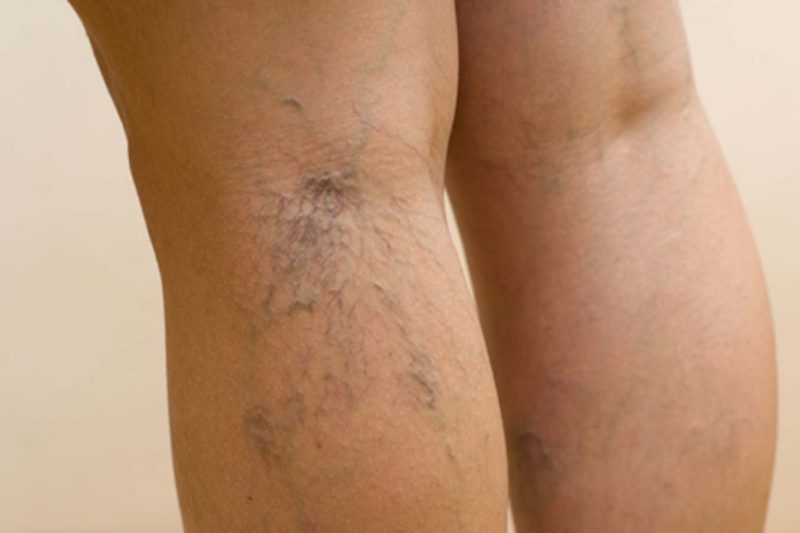
The best effect can be achieved if herbs with a similar effect are added to tea: horse chestnut, clover, raspberry. The components are mixed in equal proportions, poured with boiling water (2 tablespoons of raw materials per 0.5 liters of water) and insisted for 15-20 minutes. After this, the product is considered ready to eat. Do not drink medicinal tea more than 3-4 times a day.
Gastritis and ulcer
For scarring of a gastric ulcer and gastritis, St. John's wort oil is used. Fresh flowers are taken for its preparation. Twenty grams of St. John's wort inflorescences infused into a pulp are mixed with 200 milliliters of vegetable oil. The resulting composition for 21 days insist in a glass vessel. After that, the mixture is filtered through several layers of gauze.
Oil should be consumed one tablespoon after each meal. This allows you to protect the mucous membrane of the gastrointestinal tract from the negative effects of solid products. In addition, St. John's wort oil accelerates the healing of ulcerative defects, reduces the intensity of inflammation. The duration of treatment is not limited. The tool can be taken until complete recovery.
Hypotension, impotence
To increase the pressure, you can use alcohol tincture of St. John's wort. Would need:
- ground St. John's wort grass;
- food ethanol (70 or 96%).
The component of the drug is mixed and insisted for 2 weeks.
To prepare the solution, add 30 drops of the drug in 100 ml of water, stirring thoroughly. Multiplicity of admission is three to four times a day. It is better if the treatment is carried out before meals. Alcohol compounds are contraindicated in children. For children, water decoctions or infusions are used.
St. John's wort is used as an aphrodisiac if the problem is caused by fatigue, overwork, prolonged mental stress. The classic decoction of St. John's wort, taken 1-1.5 hours before sexual intercourse, significantly increases libido, improves potency. To improve the taste and pharmacological action of the decoction, the addition of components such as honey, mint, a tablespoon of brandy is allowed.
Dizziness
You can get rid of dizziness if you mix immortelle, St. John's wort, chamomile, birch buds in equal proportions. The resulting mixture in the amount of one tablespoon is poured with a half liter of boiling water, insisting 20 minutes. After cooling, the infusion is filtered, drunk 2 times a day, morning and evening. To improve the taste of the drug, you can add a spoonful of honey.

It should be remembered that this method is only suitable for people whose dizziness is caused by fatigue or emotional stress. With serious diseases of the brain and its vessels, St. John's wort as an independent method of treatment is useless.
Stroke, Depression, Sleepwalking
The treatment of the consequences of a stroke is often performed using phyto harvests.
The following mixture of herbs is considered the most popular:
- 20 grams of pink Rhodiola (root);
- 20 grams of rose hips (fruits);
- 15 grams of chopped nettle;
- 10 grams of hypericum.
The components are mixed together. 10 grams of the composition is poured with 250 ml of boiling water. Insist remedy for an hour. Take 2-3 times a day. The serving volume is 100 ml. The duration of the course is 2-3 months.
With depression and sleepwalking, St. John's wort helps to quickly achieve improvement in mental state.Grass can be consumed in the form of a decoction or infusion, the recipes described above. For better action, mint and valerian are added to St. John's wort in equal proportions. It is necessary to consume 200-250 ml of the solution before bedtime.
In classical medicine, St. John's wort is also widely used, the medicinal properties and contraindications for men, women and children of which have long been carefully studied. Herb extract is part of such products as Doppelherz Neurotic, Novoimanin, Negrustin, etc. These drugs can improve sleep, cope with nervous disorders, improve the emotional state.
Cough
For the treatment of cough, St. John's wort is used as a water-based infusion. To prepare it, one should two tablespoons of dried chopped herbs pour a glass of boiling water and let it brew. After a while (when the infusion cools down), it is filtered and taken. The frequency of use of the product is three to four doses per day. The duration of treatment is 1 week.
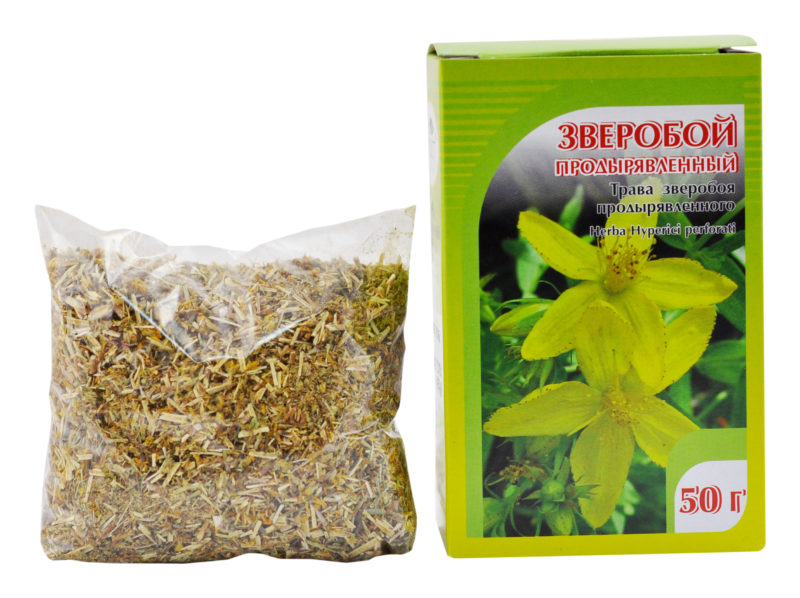
How useful is St. John's wort for coughing? The plant contains many bactericidal substances. After entering the stomach, they are absorbed into the bloodstream and begin to circulate in the body, falling, including in the focus of inflammation. The plant stimulates the immune processes, which also leads to accelerated recovery.
Oil for migraines and colds
For migraines, as well as for the treatment of rhinitis and bronchitis, essential oil can be used, which includes St. John's wort. To prepare it, you should take basil, cloves, valerian, anise, St. John's wort, ginger, cardamom, lavender, mint, lovage and tansy. All components are mixed in equal amounts. The resulting mixture is poured with vegetable oil and insisted 25-30 days. For insisting, it is better to use a dry, dark room. For 1 liter of oil should be 4 full tablespoons of plant material.

Ready-made essential oil is used by inhalation. As a rule, it is stored in small, tightly closed containers that are convenient to carry. When a migraine attack occurs, the container is opened, brought to the nose and several times in full breath inhale the aroma of oil.
Mastopathy
As an aid to the treatment of mastopathy, herbalists offer the following recipe:
- motherwort;
- St. John's wort
- caraway;
- fennel;
- valerian.
The components are mixed in equal amounts and prepared according to the recipe of infusion (pour 2 tablespoons of raw materials with a glass of boiling water, cover and let cool). It is necessary to take medicine at half a glass a day during the main course of therapy. Infusion reduces the intensity of inflammation, fights infection, and soothes.
Urolithiasis disease
St. John's wort contributes to the destruction and self-removal of stones from the kidneys and bladder. The plant is used in the form of infusion. The concentration of the drug substance is slightly lower than in previous cases. Only one tablespoon of raw material is added to a glass of boiling water.
Medications should be taken in one third of a glass 3 times a day, regardless of food intake. Such therapy allows you to accelerate the removal of stones, prevent the development of infectious complications, stimulate the healing of ureteral and renal tubule shells damaged by sharp edges of stones.
Neuralgia
Stopping attacks of neuralgia is performed using a decoction of a mixture of herbs:
- elder;
- thyme;
- Linden;
- root;
- astragalus;
- St. John's wort
The components are crushed, mixed together in equal proportions. After that, pour 0.5 liters of water and boil for 10 minutes. Ready broth can be drunk immediately after cooling and filtering. Consume 70-100 ml 3 times a day before meals.
Bad breath
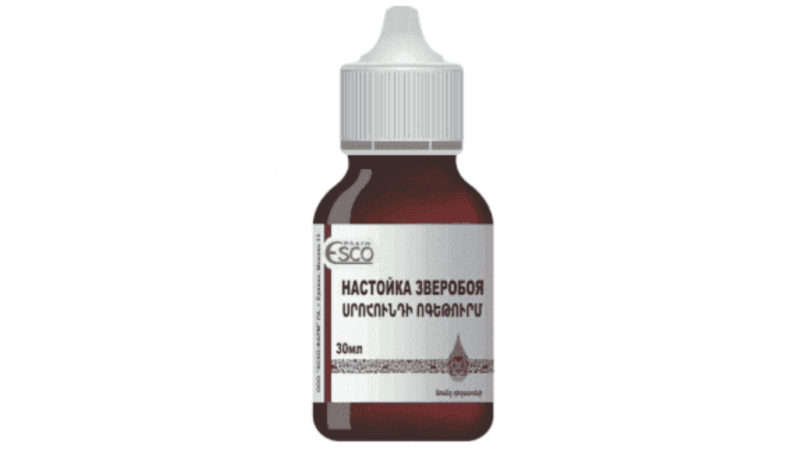
It's no secret that bad breath often occurs due to the active reproduction of bacteria in the oral cavity. St. John's wort, having a bactericidal effect, is able to destroy a colony of pathogenic microorganisms and cure the disease.To eliminate the unpleasant odor, use a decoction or infusion of grass. Apply it by rinsing. Do not swallow the broth after the procedure. Repeat 3 to 10 times a day.
Cold
With colds, decoction of St. John's wort is taken orally in 1 glass 3 times a day. The course of treatment corresponds to the time of the disease. The active components contained in the grass stimulate the immune system, have a general strengthening effect, and affect pathogens. Reception of a herbal decoction is able to reduce the time required for recovery by 2-3 days with an average disease duration of 7 days.
Liver Prevention
To prevent liver function, St. John's wort infusion is taken after meals, 3 times a day, in half a glass. The first daily intake is recommended to be performed on an empty stomach. Applied in this way, St. John's wort produces a hepatoprotective effect, accelerates the regeneration of hepatocytes (liver cells), improves blood flow in the vessels of the liver.
Psoriasis
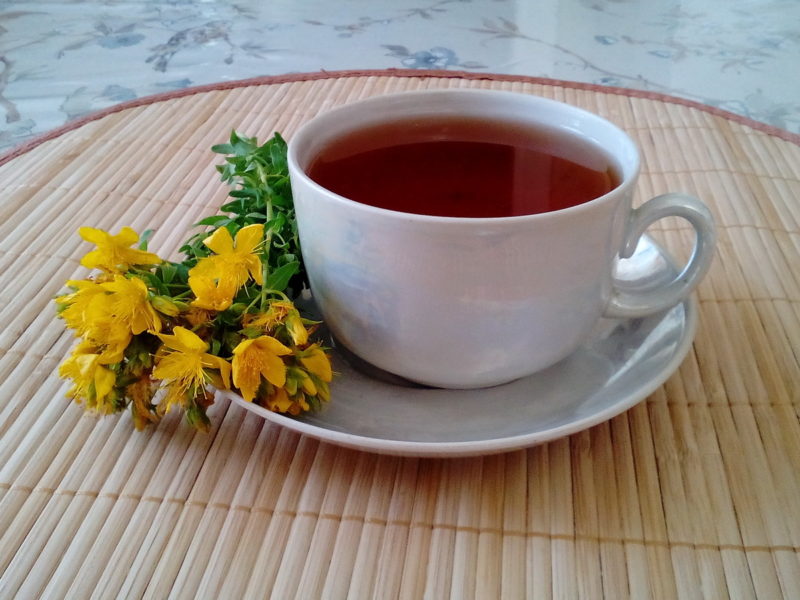
For the treatment of psoriasis, St. John's wort decoction is taken orally, and also applied to the foci of pathology. Inside, 100 ml of the drink should be consumed three times a day, after meals. Locally, the medicine is applied using a gauze napkin or clean rags. The components contained in the plant reduce vascular proliferation, relieve inflammation, and prevent the development of bacterial complications.
Radiculitis
You can get rid of pain with radiculitis if you use the old folk recipe. It is necessary to mix the ground St. John's wort with vegetable oil in a ratio of 1: 1. A couple drops of turpentine are added to the resulting composition and the painful areas are ground. It is recommended to grind daily before bedtime.
Menstruation failure
During menstruation, St. John's wort is used to reduce bleeding and correct the psychoemotional state of a woman. The extraction of nutrients is carried out by insisting or boiling the plant. You can take the medicine according to the standard scheme for most diseases (inside, 3 times a day, 150-200 ml per reception). The course of treatment is 1 week.
Stomatitis, bleeding gums
With stomatitis and bleeding gums, rinse your mouth with a decoction of St. John's wort. Manipulation is carried out several times a day, until the situation improves. The main effect here is produced by tannins and bactericidal substances contained in the plant. The former form a protective film on the mucous membrane, the latter destroy the pathogenic microflora.
Stress
Persons regularly experiencing stress are advised to take long-term prophylactic hypericum. You can prevent the effects of constant mental stress if you drink 200-250 ml of an aqueous extract of grass daily. It is recommended to do this before bedtime. St. John's wort helps to calm, improves sleep, allows you to relax and have a good rest before the start of a new day.
Pulmonary tuberculosis
When tuberculosis is used alcohol tincture of St. John's wort. For its preparation, 100 grams of crushed grass is immersed in 0.5 liters of 70% alcohol and insisted for a week. All this time the composition should be in a dry, cool room. Take the drug 3 times a day, 1-2 teaspoons. Dilution of tincture in water is allowed. The plant does not affect mycobacterium tuberculosis. Its pharmacological action in this case is to stimulate immunity.
Immunity strengthening

To strengthen immunity, St. John's wort can be taken according to any of the above recipes (infusion, broth, tincture). It is better if the product is without additional inclusions. The regimen is maintained in its original form (three times a day, in a glass). The duration of the strengthening course is a month.
Cholecystitis
With cholecystitis, St. John's wort acts as an antispasmodic and choleretic agent. Its use allows you to quickly improve the patient's condition in the chronic course of the disease.To stimulate the outflow of bile, St. John's wort decoction is mixed with other choleretic plants in equal amounts. Reception mode - 3 times a day, on an empty stomach, 1 glass each.
Cervical erosion
In the treatment of cervical erosion, St. John's wort is applied topically, in the form of douching with a decoction of grass. In addition, St. John's wort oil applied to a tampon and inserted deep into the vagina can be used. Local exposure to a medicinal plant accelerates regenerative processes, prevents bacterial infection.
Contraindications
Despite its completely natural origin, St. John's wort has certain contraindications for use.
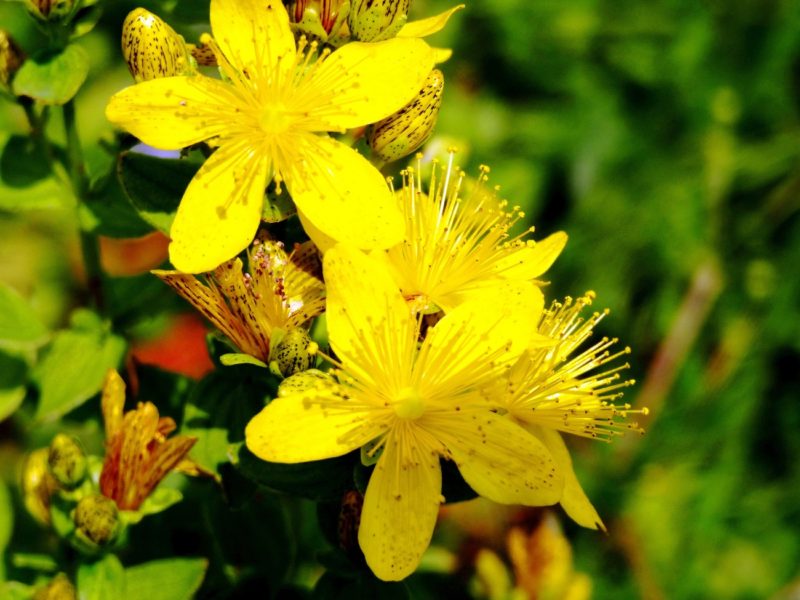
Grass cannot be used for:
- breastfeeding;
- hypertension
- taking certain medications (antibiotics, oral contraceptives, sedatives).
Note: it is not recommended to continuously take St. John's wort for more than 1 month!
As it became clear from the above, St. John's wort is a remedy for the treatment of many diseases. However, the plant is not a panacea. To use grass as an independent method of therapy is permissible only with sluggish forms of pathology. Any deterioration that occurs after taking a folk remedy requires a consultation with a doctor.







